Sep 11, 2017 | Focolare Worldwide
After Hurricane Irma’s passage over the Caribbean where it caused death and destruction, the violent storm hit Florida, which has been declared in a state of emergency. More than 5.8 million people have been left without electricity, running water or internet. Five deaths have been confirmed. It has now weakened to a category 1 hurricane, with 136 kilometer winds, and is now heading towards Atlanta, Georgia. The local Focolare community writes: “We’re in constant contact with our community in Florida. Many have had to leave their homes and find safe places to stay. They tell us that they are trying to help people who are all alone, neighbors and parents and relatives living outside the country, and the same goes for the communities on the islands. The weakening hurricane is expected to arrive in Atlanta on Monday or Tuesday with a lot of rain and strong wind. We are seeing God’s love in all of this and experiencing how much we’re all brothers and sisters, thanks to this crisis. We’re finding that we can help each other, beyond the social divisions that are quite secondary now.”
Sep 8, 2017 | Focolare Worldwide
Mexico has often been struck by seismic movements because it lies in a region where 5 tectonic plaques meet. But the earthquake which hit the nation on September 8 has been so far the most violent earthquake ever recorded (8.2 on the Richter scale). With the epicenter off the west coast, on the border with Guatemala, the earthquake was felt even as far as Mexico City. Much of the capital has remained without electricity and many people abandoned their houses going out into the dark streets. At least 15 have been found dead, although “the toll estimate is set to rise,” said President Enrique Peña Nieto. Oaxaca is the State which has been most hit. The Mexican bishops write: “God strengthens us as brothers and sisters in the faith, mobilising us towards those who have suffered because of this earthquake.” In Guatemala, one victim has been recorded.
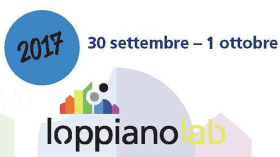
Sep 8, 2017 | Focolare Worldwide, Senza categoria
 The national workshop on economy, culture, communication, education and innovation is annually promoted by New City, Polo Lionello Bonfanti, Sophia University Institute, and the town of Loppiano which is hosting the event. In response to Pope Francis’s invitation, the aim of the convention is to offer the occasion for dialogue and proposals on the foremost issues in our country: from immigration to work, poverty to social inclusion, and battles against corruption to commitment for the common good, family, youth, education and many more. The convention will expound receptiveness to counter exclusion and the quest for private interest, promote new civic virtues to find solutions to the contradictions of our time, and act on the unjust structures that produce – precisely – “victims and bandits.” LoppianoLab is thus a cultural laboratory where the seeds of a new mentality will subsequently be sown, in the conviction that the pursuit of profit cannot be the compass for every human activity. The event is open to all those who question themselves on these themes and wish to become “artisans of change.” For information write to: loppianolab.accoglienza@loppiano.it
The national workshop on economy, culture, communication, education and innovation is annually promoted by New City, Polo Lionello Bonfanti, Sophia University Institute, and the town of Loppiano which is hosting the event. In response to Pope Francis’s invitation, the aim of the convention is to offer the occasion for dialogue and proposals on the foremost issues in our country: from immigration to work, poverty to social inclusion, and battles against corruption to commitment for the common good, family, youth, education and many more. The convention will expound receptiveness to counter exclusion and the quest for private interest, promote new civic virtues to find solutions to the contradictions of our time, and act on the unjust structures that produce – precisely – “victims and bandits.” LoppianoLab is thus a cultural laboratory where the seeds of a new mentality will subsequently be sown, in the conviction that the pursuit of profit cannot be the compass for every human activity. The event is open to all those who question themselves on these themes and wish to become “artisans of change.” For information write to: loppianolab.accoglienza@loppiano.it
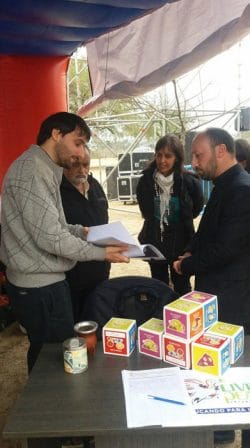
Sep 7, 2017 | Focolare Worldwide
 The Park of the Nations in Córdoba, Argentina, is always filled with children and teenagers on the “Día del Niño” (Day of the Child), which is celebrated on the third Sunday of August. The Park is the perfect place to hold games, tournaments and take walks. This year a festive crowd drew the attention of the passers-by, with the unveiling of a particularly meaningful monument: the Cube of Peace. There were games, obstacle courses, music and food just before the official unveiling in the presence of representatives from the Interreligious Commitee For Peace (COMIPAZ), members of the Armenian Church, the Jewish, Muslim and Evangelical communities. Fernanda Otero, Francisco Drab and Amelia Milagros López Loforte represented the Focolare community. The unveiling concluded with some words from Auxiliary Bishop Ricardo Seirutti who blessed the monument. It was to refrain from spinning the Cube. Each side displayed a sentence which, in spite of the rather playful and carefree atmosphere, were expected to be put into practice with seriousness and effort – and perhaps a bit of fatigue. The Cube proposes six actions that can be lived every day, each of them an expression of the Golden Rule,a version of which can be found in all religions: “Do to others what you would have them do to you:” Love everyone. Be the first to love. Love your enemy. Forgive. These are concrete gestures for a life that is counter current and courageous for the building of a more empathetic and supportive society. The unveiling was not an isolated event, but the result of many months of interaction and field work, duing which the Focolare youth took the Cube to several quarters in the city, as an educational tool for teaching peace through play and theatre. In neighbourhoods on the peripheries of Ciudad Evita, San Roque, Cabildo, Müller, Argüello where people live amidst violence, with their civil rights often violated and with the children of the Sierra Dorada Foundation in San Marcos Sierras, they worked side by side with local communities and organisations who are desirous of becoming more aware of local problems and taking direct action in favour of more incisive and effective social training. The project, sustained by the Focolare Movement, the organization for the defense of the rights of children and teenagers from the Province of Córdoba, the Living Peace Programme and the Interreligious Comittee for Peace, along with other organizations and public and private entities, aims to spread peace in all parts of society, beginning with a set of best practices for working with children, but valid for adults and in all environments. Similar activities are spreading in many other countries: Italy, Spain, Egypt, Hungary and Brazil where the now famous Cube has become the protagonist of a vast variety of educational projects and seminars. In Argentina, another Cube of Peace has been placed in a public area in Concepción, in the Province of Tucumán. Still in Córdoba, three days ealier, the Cube project was declared a cultural interest by the City Council. A small monument that continually comes to life.
The Park of the Nations in Córdoba, Argentina, is always filled with children and teenagers on the “Día del Niño” (Day of the Child), which is celebrated on the third Sunday of August. The Park is the perfect place to hold games, tournaments and take walks. This year a festive crowd drew the attention of the passers-by, with the unveiling of a particularly meaningful monument: the Cube of Peace. There were games, obstacle courses, music and food just before the official unveiling in the presence of representatives from the Interreligious Commitee For Peace (COMIPAZ), members of the Armenian Church, the Jewish, Muslim and Evangelical communities. Fernanda Otero, Francisco Drab and Amelia Milagros López Loforte represented the Focolare community. The unveiling concluded with some words from Auxiliary Bishop Ricardo Seirutti who blessed the monument. It was to refrain from spinning the Cube. Each side displayed a sentence which, in spite of the rather playful and carefree atmosphere, were expected to be put into practice with seriousness and effort – and perhaps a bit of fatigue. The Cube proposes six actions that can be lived every day, each of them an expression of the Golden Rule,a version of which can be found in all religions: “Do to others what you would have them do to you:” Love everyone. Be the first to love. Love your enemy. Forgive. These are concrete gestures for a life that is counter current and courageous for the building of a more empathetic and supportive society. The unveiling was not an isolated event, but the result of many months of interaction and field work, duing which the Focolare youth took the Cube to several quarters in the city, as an educational tool for teaching peace through play and theatre. In neighbourhoods on the peripheries of Ciudad Evita, San Roque, Cabildo, Müller, Argüello where people live amidst violence, with their civil rights often violated and with the children of the Sierra Dorada Foundation in San Marcos Sierras, they worked side by side with local communities and organisations who are desirous of becoming more aware of local problems and taking direct action in favour of more incisive and effective social training. The project, sustained by the Focolare Movement, the organization for the defense of the rights of children and teenagers from the Province of Córdoba, the Living Peace Programme and the Interreligious Comittee for Peace, along with other organizations and public and private entities, aims to spread peace in all parts of society, beginning with a set of best practices for working with children, but valid for adults and in all environments. Similar activities are spreading in many other countries: Italy, Spain, Egypt, Hungary and Brazil where the now famous Cube has become the protagonist of a vast variety of educational projects and seminars. In Argentina, another Cube of Peace has been placed in a public area in Concepción, in the Province of Tucumán. Still in Córdoba, three days ealier, the Cube project was declared a cultural interest by the City Council. A small monument that continually comes to life.
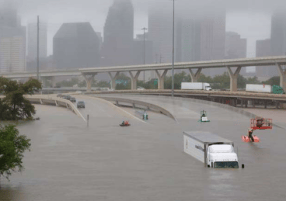
Sep 5, 2017 | Focolare Worldwide
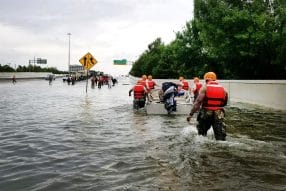 As Harvey’s fury fades and tears are shed for victims whose numbers are growing by the hour, the devastation left behind by the hurricane and the growing concern over contaminated water, especially in Houston, is becoming clearer and clearer within the city which is home to hundreds of large and important chemical and oil plants There is already a mixture of pesticides, waste and solvents that can do further damage to humans and the environment even after Harvey. Last September 1st there was a choral outcry for more attention and care for Creation just as Texas was emerging from the receding flood waters. It is not only the uncontrollable forces of nature that give us pause, but also our responsibility in using the goods of the earth. With regard to the risk of contamination: it has been estimated that the millions of people from Texas’s 38 counties that have been affected by Hurricane Harvey use private water sources that are not subjected to the same controls as public water systems and are at risk of contamination. “
As Harvey’s fury fades and tears are shed for victims whose numbers are growing by the hour, the devastation left behind by the hurricane and the growing concern over contaminated water, especially in Houston, is becoming clearer and clearer within the city which is home to hundreds of large and important chemical and oil plants There is already a mixture of pesticides, waste and solvents that can do further damage to humans and the environment even after Harvey. Last September 1st there was a choral outcry for more attention and care for Creation just as Texas was emerging from the receding flood waters. It is not only the uncontrollable forces of nature that give us pause, but also our responsibility in using the goods of the earth. With regard to the risk of contamination: it has been estimated that the millions of people from Texas’s 38 counties that have been affected by Hurricane Harvey use private water sources that are not subjected to the same controls as public water systems and are at risk of contamination. “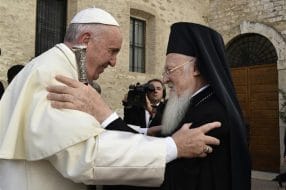 It is time to think about the tremendous power of nature and of human responsibility to be good and wise administrators of the environment,” writes Ecumenical Patriarch Bartholomew, known for his involvement in promoting care for the environment. “We are all called to to take part in the redemption and care of our world, working to stem the destructive force of such hurricanes through better environmental planning, or by being more seriously involved in combatting the serious problem of climate change and the way in which it interferes with our planet; or even to beomc personally involved on the field, with charitable projects that can help and support those whose lives are so drastically changed in the bat of an eye because of changes in the climate. In their joint statement on the Day of Prayer for Creation, Pope Francis and Patriarch Bartholomew stated: We urgently appeal to those in positions of social and economic, as well as political and cultural, responsibility to hear the cry of the earth and to attend to the needs of the marginalized, but above all to respond to the plea of millions and support the consensus of the world for the healing of our wounded creation. We are convinced that there can be no sincere and enduring resolution to the challenge of the ecological crisis and climate change unless the response is concerted and collective, unless the responsibility is shared and accountable, unless we give priority to solidarity and service.
It is time to think about the tremendous power of nature and of human responsibility to be good and wise administrators of the environment,” writes Ecumenical Patriarch Bartholomew, known for his involvement in promoting care for the environment. “We are all called to to take part in the redemption and care of our world, working to stem the destructive force of such hurricanes through better environmental planning, or by being more seriously involved in combatting the serious problem of climate change and the way in which it interferes with our planet; or even to beomc personally involved on the field, with charitable projects that can help and support those whose lives are so drastically changed in the bat of an eye because of changes in the climate. In their joint statement on the Day of Prayer for Creation, Pope Francis and Patriarch Bartholomew stated: We urgently appeal to those in positions of social and economic, as well as political and cultural, responsibility to hear the cry of the earth and to attend to the needs of the marginalized, but above all to respond to the plea of millions and support the consensus of the world for the healing of our wounded creation. We are convinced that there can be no sincere and enduring resolution to the challenge of the ecological crisis and climate change unless the response is concerted and collective, unless the responsibility is shared and accountable, unless we give priority to solidarity and service.  Meanwhile, news has arrived from the Focolare community in Houston. Joelma, Carmina and Chiara and Kate write: “Thanks for your prayers, your closeness and your many meassages that have been arriving. Everyone in our community is safe. Some had to evacuate their homes, and others had their homes flooded, but weren’t forced to leave them. The neighbourhood where the focolare house is located was on high enough land to stay dry, but it’s like an island because all the land around it is flooded. It was hard to watch all the flooding from a house that was dry and secure, knowing that the lives of many of the people around us were in danger. Unfortunately, we just learned that the relatives of several people from our community in Corpus Christi, the first Texan city to be hit by the hurricane’s fury, were killed as the six of them tried to escape the flood waters. We’re trying to understand the best way to help right now, also because it’s still very dangerous to be out driving. Two nurses from the local community, Marga and Augie, are working around the clock at their hospital due to the shortage of staff. One young person was able to travel around and reach other volunteers, and a couple with a canoe was able to give a hand rowing through neighbourhoods.
Meanwhile, news has arrived from the Focolare community in Houston. Joelma, Carmina and Chiara and Kate write: “Thanks for your prayers, your closeness and your many meassages that have been arriving. Everyone in our community is safe. Some had to evacuate their homes, and others had their homes flooded, but weren’t forced to leave them. The neighbourhood where the focolare house is located was on high enough land to stay dry, but it’s like an island because all the land around it is flooded. It was hard to watch all the flooding from a house that was dry and secure, knowing that the lives of many of the people around us were in danger. Unfortunately, we just learned that the relatives of several people from our community in Corpus Christi, the first Texan city to be hit by the hurricane’s fury, were killed as the six of them tried to escape the flood waters. We’re trying to understand the best way to help right now, also because it’s still very dangerous to be out driving. Two nurses from the local community, Marga and Augie, are working around the clock at their hospital due to the shortage of staff. One young person was able to travel around and reach other volunteers, and a couple with a canoe was able to give a hand rowing through neighbourhoods.
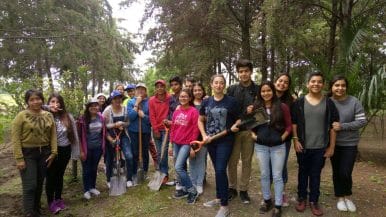
Sep 1, 2017 | Focolare Worldwide, Senza categoria
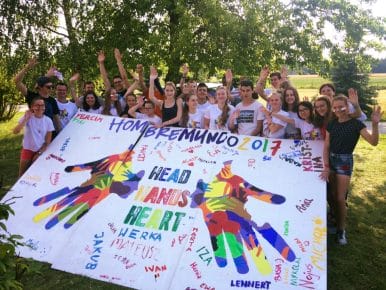 From Central and South America, to Europe, Afica and Middle East, fifty laboratories for forming people who are open, inclusive, world citizens who wish to offer the wealth of their own cultures while being open to that of others. Every three years the Focolare’s Teens for Unity hold a series of international workshops in which they can be formed in a culture of fraternity as the antidote to division, intolerance and hate. Each workshop had two phases. The first phase consisted in learning to know and respect the other’s culture as one’s own. The second, to take concrete action, especially in the most needy peripheries with the most disadvantaged people: the homeless, orphans, immigrants and Rom. In Lithuania, the teenagers of the workshops – which included groups from Switzerland – visited a hospital for the disabled and mentally ill where they managed to engage a girl who was usually unresponsive to any kind of stimulation. In the small European state of Škofia Loka, Slovenia, their goal was to engage the homeless. In Bratisslava, German and Slovak teenagers volunteered to clean the shores of the Danube, where they collected six tons of trash. There were also concerts, flashmobs, and folk festivals on several public squares of Eastern Europe which caught the curiosity and intererst of the media. Several teenagers were interviewed on national television at Mariapolis Faro. The Mariapolis in Croatia was turned into an international microcosm with 280 teenagers from 22 nations, and twelve translations for teenagers from such places as Palestine, Israel, Lebanon, Jordan, Syria and Venezuela. “When I talked with the guys from Venezuela,” says a girl from the Holy Land, “I found out that there are problems in every country. We’re at war, but at least we have food to eat. In Venezuela, they don’t even have any. So, I brought a basket and suggested that we put what we had in common.” Another teenager: “From now on, when someone asks me how many brothers and sisters I have, I’ll say 280!” “A group of girls arriving from the United State lost their luggage at the airport. The luggage was located and returned to them a few days later. In the meantime – used as they were to always having everything they needed – they experienced what it’s like to depend on the love (and clothing) of others. In Serbia, the workshop opened in Cardak, an hour drive from Belgrade. The teenagers were hosted at a state institute, in a wooded area where hundreds of refugees had recently passed from the Balkans: a simbol of beauty and suffering in the tormented march toward the unity of peoples, Churches and religions. They also experienced the diversity of religions – many of them Christian and Muslim – and of different traditions – among them Catholic, Orthodox, Lutheran, Evangelical and Anglican. Some didn’t confess any particular creed, but everyone felt perfectly integrated.
From Central and South America, to Europe, Afica and Middle East, fifty laboratories for forming people who are open, inclusive, world citizens who wish to offer the wealth of their own cultures while being open to that of others. Every three years the Focolare’s Teens for Unity hold a series of international workshops in which they can be formed in a culture of fraternity as the antidote to division, intolerance and hate. Each workshop had two phases. The first phase consisted in learning to know and respect the other’s culture as one’s own. The second, to take concrete action, especially in the most needy peripheries with the most disadvantaged people: the homeless, orphans, immigrants and Rom. In Lithuania, the teenagers of the workshops – which included groups from Switzerland – visited a hospital for the disabled and mentally ill where they managed to engage a girl who was usually unresponsive to any kind of stimulation. In the small European state of Škofia Loka, Slovenia, their goal was to engage the homeless. In Bratisslava, German and Slovak teenagers volunteered to clean the shores of the Danube, where they collected six tons of trash. There were also concerts, flashmobs, and folk festivals on several public squares of Eastern Europe which caught the curiosity and intererst of the media. Several teenagers were interviewed on national television at Mariapolis Faro. The Mariapolis in Croatia was turned into an international microcosm with 280 teenagers from 22 nations, and twelve translations for teenagers from such places as Palestine, Israel, Lebanon, Jordan, Syria and Venezuela. “When I talked with the guys from Venezuela,” says a girl from the Holy Land, “I found out that there are problems in every country. We’re at war, but at least we have food to eat. In Venezuela, they don’t even have any. So, I brought a basket and suggested that we put what we had in common.” Another teenager: “From now on, when someone asks me how many brothers and sisters I have, I’ll say 280!” “A group of girls arriving from the United State lost their luggage at the airport. The luggage was located and returned to them a few days later. In the meantime – used as they were to always having everything they needed – they experienced what it’s like to depend on the love (and clothing) of others. In Serbia, the workshop opened in Cardak, an hour drive from Belgrade. The teenagers were hosted at a state institute, in a wooded area where hundreds of refugees had recently passed from the Balkans: a simbol of beauty and suffering in the tormented march toward the unity of peoples, Churches and religions. They also experienced the diversity of religions – many of them Christian and Muslim – and of different traditions – among them Catholic, Orthodox, Lutheran, Evangelical and Anglican. Some didn’t confess any particular creed, but everyone felt perfectly integrated.  At Paztún, in the Maya Kapchikel region of Guatamala, the workshop from Central America gathered 160 teenagers from Panama, Costa Rica, Honduras, El Salvador and Guatamala, along with some teenagers from the Quiché ethnic group in Santa Lucia Utatlán. The indiscriminate chopping down of entire forests – a real wound to the land – urged them to plant on a stretch of public land, thousands of fur trees that were donated by the state.In the Southern Cone, Global Citizen took on the color of social action with projects that favored knowing one another and valuing the richness of the South American people. In the workshop at Cunaco. Educational and recreational workshops were held in Chile, along with solidarity projects. In Paraguay there were seminars, visits to Guaraní communities of Ita and a day with the teenagers from Barrio Vida, a social centre animated by the Focolare periphery of Motevideo. It included activities for children, workshops, sport tournaments and games for the public. In Argentina they shared in the life of their peers from the Island of Margherita, in the region of the Tigre, north of Buenos Aires on the Rio de la Plata.
At Paztún, in the Maya Kapchikel region of Guatamala, the workshop from Central America gathered 160 teenagers from Panama, Costa Rica, Honduras, El Salvador and Guatamala, along with some teenagers from the Quiché ethnic group in Santa Lucia Utatlán. The indiscriminate chopping down of entire forests – a real wound to the land – urged them to plant on a stretch of public land, thousands of fur trees that were donated by the state.In the Southern Cone, Global Citizen took on the color of social action with projects that favored knowing one another and valuing the richness of the South American people. In the workshop at Cunaco. Educational and recreational workshops were held in Chile, along with solidarity projects. In Paraguay there were seminars, visits to Guaraní communities of Ita and a day with the teenagers from Barrio Vida, a social centre animated by the Focolare periphery of Motevideo. It included activities for children, workshops, sport tournaments and games for the public. In Argentina they shared in the life of their peers from the Island of Margherita, in the region of the Tigre, north of Buenos Aires on the Rio de la Plata.




 As Harvey’s fury fades and tears are shed for victims whose numbers are growing by the hour, the devastation left behind by the hurricane and the growing concern over contaminated water, especially in Houston, is becoming clearer and clearer within the city which is home to hundreds of large and important chemical and oil plants There is already a mixture of pesticides, waste and solvents that can do further damage to humans and the environment even after Harvey. Last September 1st there was a choral outcry for more attention and care for Creation just as Texas was emerging from the receding flood waters. It is not only the uncontrollable forces of nature that give us pause, but also our responsibility in using the goods of the earth. With regard to the risk of contamination: it has been estimated that the millions of people from Texas’s 38 counties that have been affected by Hurricane Harvey use private water sources that are not subjected to the same controls as public water systems and are at risk of contamination. “
As Harvey’s fury fades and tears are shed for victims whose numbers are growing by the hour, the devastation left behind by the hurricane and the growing concern over contaminated water, especially in Houston, is becoming clearer and clearer within the city which is home to hundreds of large and important chemical and oil plants There is already a mixture of pesticides, waste and solvents that can do further damage to humans and the environment even after Harvey. Last September 1st there was a choral outcry for more attention and care for Creation just as Texas was emerging from the receding flood waters. It is not only the uncontrollable forces of nature that give us pause, but also our responsibility in using the goods of the earth. With regard to the risk of contamination: it has been estimated that the millions of people from Texas’s 38 counties that have been affected by Hurricane Harvey use private water sources that are not subjected to the same controls as public water systems and are at risk of contamination. “ It is time to think about the tremendous power of nature and of human responsibility to be good and wise administrators of the environment,” writes Ecumenical Patriarch Bartholomew, known for his involvement in promoting care for the environment. “We are all called to to take part in the redemption and care of our world, working to stem the destructive force of such hurricanes through better environmental planning, or by being more seriously involved in combatting the serious problem of climate change and the way in which it interferes with our planet; or even to beomc personally involved on the field, with charitable projects that can help and support those whose lives are so drastically changed in the bat of an eye because of changes in the climate. In their joint statement on the Day of Prayer for Creation, Pope Francis and Patriarch Bartholomew stated: We urgently appeal to those in positions of social and economic, as well as political and cultural, responsibility to hear the cry of the earth and to attend to the needs of the marginalized, but above all to respond to the plea of millions and support the consensus of the world for the healing of our wounded creation. We are convinced that there can be no sincere and enduring resolution to the challenge of the ecological crisis and climate change unless the response is concerted and collective, unless the responsibility is shared and accountable, unless we give priority to solidarity and service.
It is time to think about the tremendous power of nature and of human responsibility to be good and wise administrators of the environment,” writes Ecumenical Patriarch Bartholomew, known for his involvement in promoting care for the environment. “We are all called to to take part in the redemption and care of our world, working to stem the destructive force of such hurricanes through better environmental planning, or by being more seriously involved in combatting the serious problem of climate change and the way in which it interferes with our planet; or even to beomc personally involved on the field, with charitable projects that can help and support those whose lives are so drastically changed in the bat of an eye because of changes in the climate. In their joint statement on the Day of Prayer for Creation, Pope Francis and Patriarch Bartholomew stated: We urgently appeal to those in positions of social and economic, as well as political and cultural, responsibility to hear the cry of the earth and to attend to the needs of the marginalized, but above all to respond to the plea of millions and support the consensus of the world for the healing of our wounded creation. We are convinced that there can be no sincere and enduring resolution to the challenge of the ecological crisis and climate change unless the response is concerted and collective, unless the responsibility is shared and accountable, unless we give priority to solidarity and service. 
